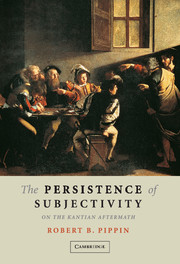Book contents
- Frontmatter
- Contents
- Acknowledgments
- The Persistence of Subjectivity
- 1 Introduction: “Bourgeois Philosophy” and the Problem of the Subject
- PART I SETTING
- PART II THEORISTS
- 3 Necessary Conditions for the Possibility of What Isn't: Heidegger on Failed Meaning
- 4 Gadamer's Hegel: Subjectivity and Reflection
- 5 Negative Ethics: Adorno on the Falseness of Bourgeois Life
- 6 The Unavailability of the Ordinary: Strauss on the Philosophical Fate of Modernity
- 7 Hannah Arendt and the Bourgeois Origins of Totalitarian Evil
- 8 On Not Being a Neo-Structuralist: Remarks on Manfred Frank and Romantic Subjectivity
- 9 Leaving Nature Behind, or Two Cheers for Subjectivism: On John McDowell
- Postscript: On McDowell's Response to “Leaving Nature Behind”
- PART III MODERN MORES
- PART IV EXPRESSION
- Bibliography
- Name Index
- Subject Index
6 - The Unavailability of the Ordinary: Strauss on the Philosophical Fate of Modernity
Published online by Cambridge University Press: 05 June 2012
- Frontmatter
- Contents
- Acknowledgments
- The Persistence of Subjectivity
- 1 Introduction: “Bourgeois Philosophy” and the Problem of the Subject
- PART I SETTING
- PART II THEORISTS
- 3 Necessary Conditions for the Possibility of What Isn't: Heidegger on Failed Meaning
- 4 Gadamer's Hegel: Subjectivity and Reflection
- 5 Negative Ethics: Adorno on the Falseness of Bourgeois Life
- 6 The Unavailability of the Ordinary: Strauss on the Philosophical Fate of Modernity
- 7 Hannah Arendt and the Bourgeois Origins of Totalitarian Evil
- 8 On Not Being a Neo-Structuralist: Remarks on Manfred Frank and Romantic Subjectivity
- 9 Leaving Nature Behind, or Two Cheers for Subjectivism: On John McDowell
- Postscript: On McDowell's Response to “Leaving Nature Behind”
- PART III MODERN MORES
- PART IV EXPRESSION
- Bibliography
- Name Index
- Subject Index
Summary
In Natural Right and History, Leo Strauss argues for the continuing “relevance” of the classical understanding of natural right. Since this relevance is not a matter of a direct return or a renewed appreciation that a neglected doctrine is simply true, the meaning of this claim is somewhat elusive. But it is clear enough that the core of Strauss's argument for that relevance is a claim about the relation between human experience and philosophy. Strauss argues that the classical understanding articulates and is continuous with the “lived experience” of engaged participants in political life. He appears to mean by this the everyday experience of choices, conflicts, and of other human beings as these appear from the participant point of view, “within” some sort of horizon established by their various engagements and practical projects. In the modern world, by contrast, he claims that we have manufactured a kind of artificial experience, have created by education and training over the course of time habits of heart and mind that have obscured and distorted how the human things originally make sense just as matters of praxis. Because of this we have been left disoriented and at a loss with respect to the basic questions about how to live that unavoidably appear within this participant point of view. This is the heart of our “crisis.”
- Type
- Chapter
- Information
- The Persistence of SubjectivityOn the Kantian Aftermath, pp. 121 - 145Publisher: Cambridge University PressPrint publication year: 2005

